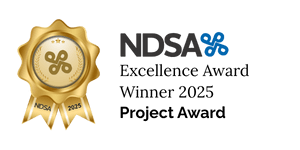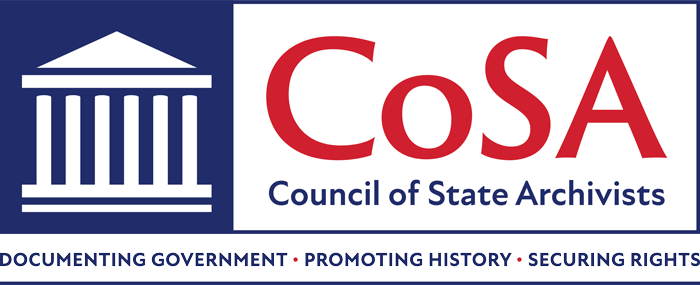ACCESS Grant Products
Implementing ACCESS: Guiding the Creation, Preservation, & Use of Electronic Records
AWARE: Archives Working Across Remote Environments
The CoSA AWARE (Archives Working Across Remote Environments) project, initially funded by an IMLS grant awarded in 2023, investigated the needs of territorial and non-contiguous state archives. Consultants Eira Tansey and Helen Wong Smith conducted site visits between November 2024 and April 2025 to seven site partners: Puerto Rico, Guam, Northern Mariana Islands, American Samoa, Alaska, US Virgin Islands, and Washington, DC.
Year over year, a range of needs are expressed by territorial archivists, spanning lack of funding, failing physical infrastructure, attracting and retaining staff with varied backgrounds and skillsets, increasing costs, supply chain issues, and impending and realized environmental disasters. In the last several years, these issues have been amplified by pandemic-related closures, inflation, social unrest, and increasing frequency in emergencies (for example, hardware failure, building deterioration, and storms).
BACKER: Building Archival Capacity for Keeping Electronic Records

CoSA PREPARE: Preparing Archives for Records in Email
The Council of State Archivists (CoSA) received a two-year Mellon grant (2021-2023), a subaward to CoSA from the University of Illinois to develop and deliver a variety of capacity-building activities for email preservation and access, including:
- Needs Assessment - this will allow state and territorial archives to identify the key roadblocks to archiving, preserving, and providing access to email collections of state records.
- Development of Best Practice Documents - CoSA will develop a series of documents that will make clear current and best practices for the transfer, accession, and preservation of email records and other forms of electronic communication.
- Applications, Tools, & Protocols Testing - currently, processing is an impediment to archives providing access to email collections. CoSA will evaluate how tools currently in use compare to one another.
- Technical Assistance & Mentoring - states and territories that currently have strong email preservation and processing capabilities will provide insight and information to states and territories looking to establish or deepen their capacity to manage email.
- Deepening Communities of Practice - CoSA will continue to support the communities of practice among its members and work to deepen the relationships and the resources for those communities specifically around email accession, preservation, and access.
This project will foster ongoing learning, information exchange, and collaboration among state/territorial archives and the archival community at large. State government emails comprise millions of records, therefore, this project’s activities will focus on providing practical solutions for the collection, preservation, and accessibility of a discrete, but incredibly important, subset – the email generated by governors, lieutenant governors, secretaries of state, and key state legislators – that will also be applicable to other government officials.
Learn more about CoSA’s PREPARE work as well as work from other projects that are part of the University of Illinois Email Archives: Building Capacity and Community effort in this presentation recorded for the Coalition for Networked Information (CNI)’s spring 2021 meeting.
Final Report
Be Prepared: Managing and Preserving Email in State and Territorial Governments (2023) is the final report of CoSA’s two-year email preservation capacity and community-building grant, PREPARE: Preparing Archives for Records in Email, generously supported through the University of Illinois and the Mellon Foundation. The report summarizes the three phases of PREPARE, as well as breaks the tasks of email management in state and territorial government into three sections: a technical overview of the essential characteristics of email, a summary of the governance issues challenging CoSA’s membership, and some recommendations for archival practitioners and administrators.
Be Prepared includes a short bibliography of valuable standards, prior research by CoSA and others, as well as other PREPARE resources. Additionally, a set of talking points for high-level discussions is provided for archival administrators to aid in building relationships with key stakeholders in government email management.
Email is a big challenge for state and territorial governments, and PREPARE can be the place for a coordinated, concentrated effort to begin.
MoVE-IT (Modeling Viable Electronic Information Transfers)
State archives reported exponential growth (1693%) of electronic records during the decade between 2006-2016. Fewer than half of state agencies participating in a 2019 CoSA/Preservica survey reported having permanent state electronic government records in their custody. This underscores the risk that government electronic records appraised for transfer from agencies may never reach the state archives for preservation. Additional gaps revealed in Toward a Common Understanding, the report about the survey, highlighted a lack of consensus about where permanent electronic state records are stored and which protocols are available for transfer.
The Council of State Archivists is committed to aiding its membership developing efficient and effective protocols for the identification and transfer of permanent electronic records to designated repositories for permanent preservation. To this end, and with the generous support and collaboration of Preservica, Inc. and AVP, Inc. this research project seeks to find the best examples of electronic records transfers nationwide and to determine what success factors those exemplars have, with the goal of developing a body of best practices for electronic records transfers. Additionally, those best practices will inform the creation of tools (such as guidance documents, templates, and more) that CoSA’s membership can implement to enhance their own practices.
Project Methodology
In order to accomplish this, CoSA will engage a focus group of expert digital archivists to identify, describe, and analyze these exemplar transfers.
This group will analyze examples that cover transfers of common record types (e.g., reports, election results, executive orders, licenses) from specific agencies (e.g., Governor’s Office, State Engineer, DOJ), and from widely used systems (such as Office365, GIS, CJIS). The project will produce case studies about the exemplar transfer projects, an analysis of the common success factors, and recommendations for how to execute a successful transfer project, with the goal of promoting good practices.
CoSA expects this project to take the bulk of 2020 to achieve, with the majority of the data gathering and analysis to occur over the summer.
